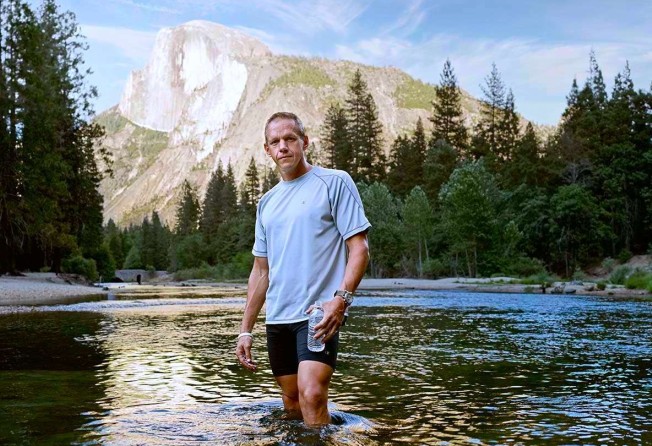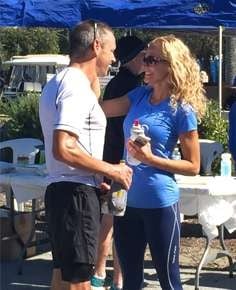
By Charlie Engle
Simon & Schuster
Engle was a drug addict and alcoholic for a decade, but when he hit rock bottom it was running that saved his life, as he recounts in this personable, plain-speaking autobiography


On any given weekend, Hong Kong’s trails are likely to be well populated with runners – on solo dashes in the latest equipment, in pairs or small groups, or in a pack taking part in one of the races that stud the city’s events calendar. Trail running seems to have exploded in popularity in recent years. Inclusive, accessible and addictive, the sport is an antidote to long hours spent in the office.
For ultramarathoner Charlie Engle, running – whether across the Sahara or Gobi, or on the track at Beckley federal prison, in West Virginia, in the United States – is what saved his life.
One of a trio who became the first to run across the Sahara Desert – from Senegal to the Red Sea, a distance of almost 7,000km – Engle has now published a memoir, Running Man, that chronicles his decade-long addiction to drugs and alcohol, his ascent in the ultramarathon and adventure-racing world and his 16 months behind bars. “Running Man” was Engle’s prison nickname.
Engle begins his story in 2011, lying in his prison cell, the jangling of keys signalling the morning head count. He is “the middle-aged white guy who ran laps alone on the quarter-mile track in the prison’s recreation yard” and “the fool pounding out miles on the hard floor next to my bunk” when the jail is in lockdown.
It is July and Engle is thinking about Badwater, the 217km race in California’s Death Valley that is billed as the world’s toughest foot race, and in which our hero has twice finished third. Of course, being in jail means he can’t compete. But in a moment of inspiration – madness? – Engle decides that he can create his own 217km challenge. He tells no one of this “race”.
Although Engle started racing marathons in 1989, beginning with one in Big Sur, California, the North Carolina native had been running all his life. From the opening pages of the memoir, running factors heavily – as a fourth-grader he would sprint across a cow pasture to deliver the family rent cheque – but so too does alcohol.

By the time he reached his sophomore year at university, his alcohol and cocaine binges lasted for days and ended only when he ran out of money. Each crash, Engle promised himself, would be the last.
“Step one in my total transformation was almost always lacing up my shoes and going out for a run,” writes Engle.
But he fell further. Engle moved to California, where he worked for his father. He got married. He finished that first marathon in Big Sur but, while he experienced a sense of relief, there was also “despair” and Engle called his drug dealer as soon as he got home. His spiral downward continued – he checked into rehab, he relapsed. Finally, he hit rock bottom after a drug dealer shot at his car.

All of this would be enough to fill an entire book, but in Running Man, it is just the first 60 pages.
Engle ran his way to recovery, entering races around the US.
In late 1995, he took a temporary job in Brisbane, Australia. He found an Alcoholics Anonymous (AA) meeting and then entered a race. Except, it was a 52km trail race that he misread as a 5km jaunt through a state forest. The discovery that there are distances beyond the marathon was a turning point.
He recalls some advice from AA: “Sometimes the universe does for you what you are unable to do for yourself … And now I wondered: how much farther could I go?”

Engle competed in several televised Eco-Challenge events, the precursor to the reality TV show Survivor. Fame arrived via a segment on CBS’ 48 Hours, in which he wove together the challenges of running and sobriety.
“It was cathartic for me to have put into words what I was doing and why I was doing it – to explain my belief that this kind of suffering led to enlightenment and personal growth.”
Following several more adventure races everywhere from Vietnam to Brazil, Engle and fellow ultra-runners Ray Zahab, of Canada, and Kevin Lin, of Taiwan, decided to raise money by running across the Sahara. The accompanying documentary, Running the Sahara, is narrated and executive produced by actor Matt Damon; the money raised helped deliver clean water in Africa.

The final third of the book deals with Engle’s time in jail. He was convicted of mortgage fraud and of lying on loan applications and received a 21-month sentence.
His time behind bars is recounted in the same personable tone Engle takes when discussing his battle with crack cocaine and alcohol. His voice is conversational – it’s easy to imagine him recounting his story at a barbecue – and there’s an easiness to his words; a plainness of language that makes his story all the more arresting.
Engle is open about addiction, sobriety, running and prison, but it’s his internal struggles that make Running Man a powerful read. This is man versus himself; a man surviving himself.
In many ways, Running Man is itself like an ultramarathon: the reader experiences a roller coaster of emotions, from sadness and disbelief to shock, admiration and respect. And then, at the finish line – perhaps like the author – is left asking, “What’s next?”